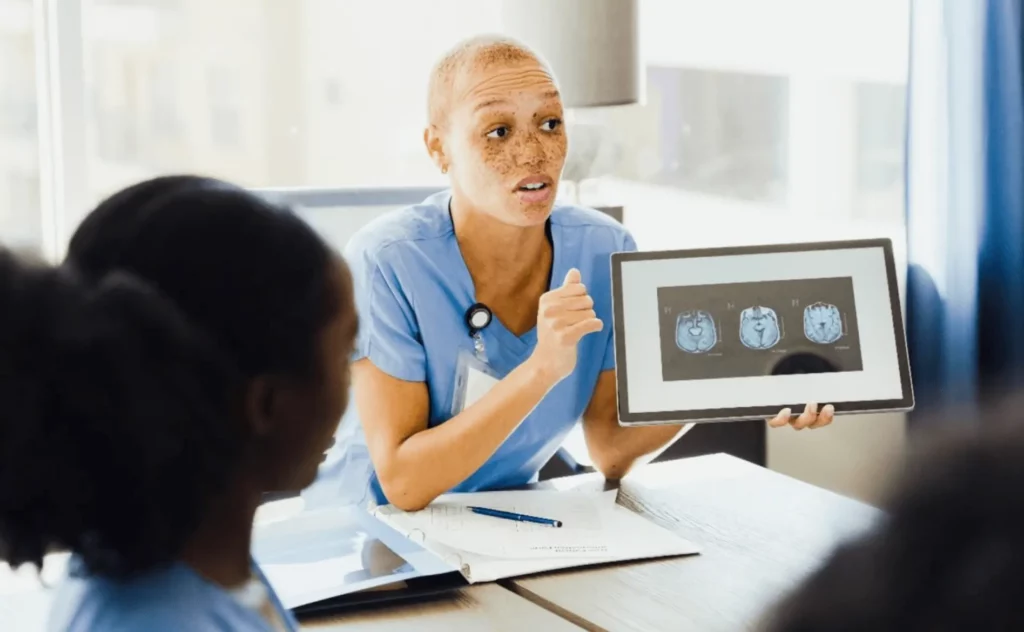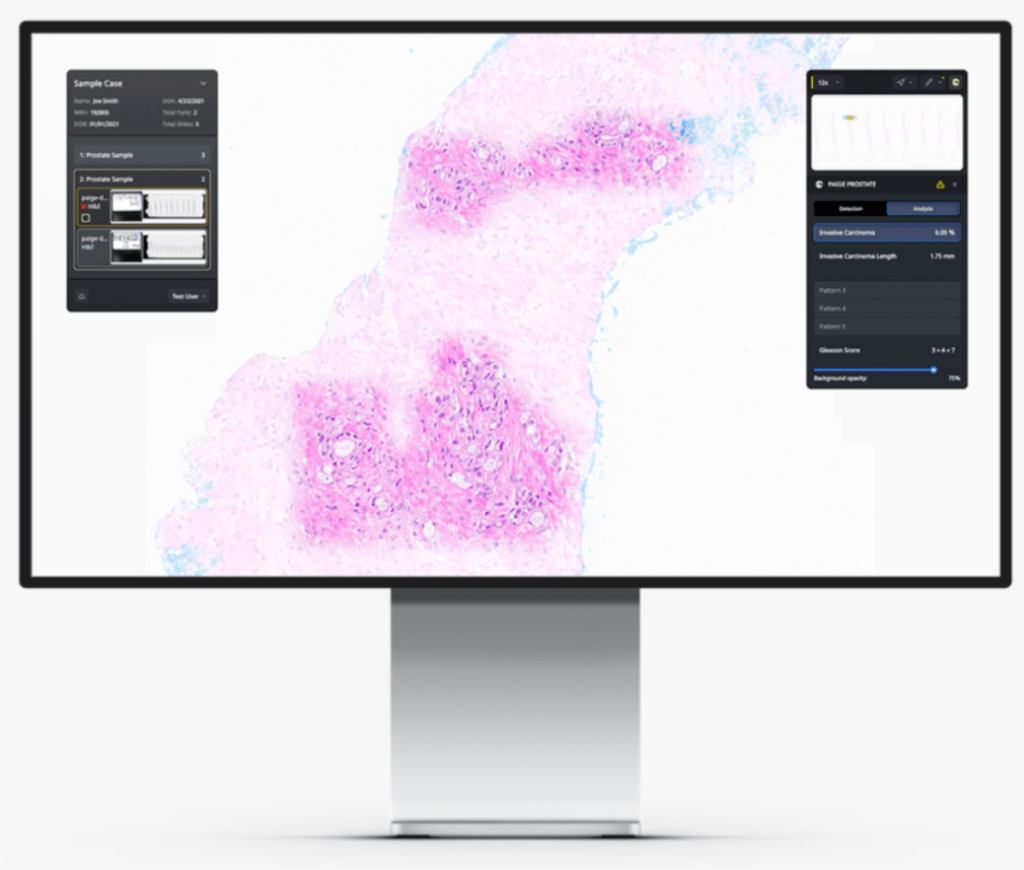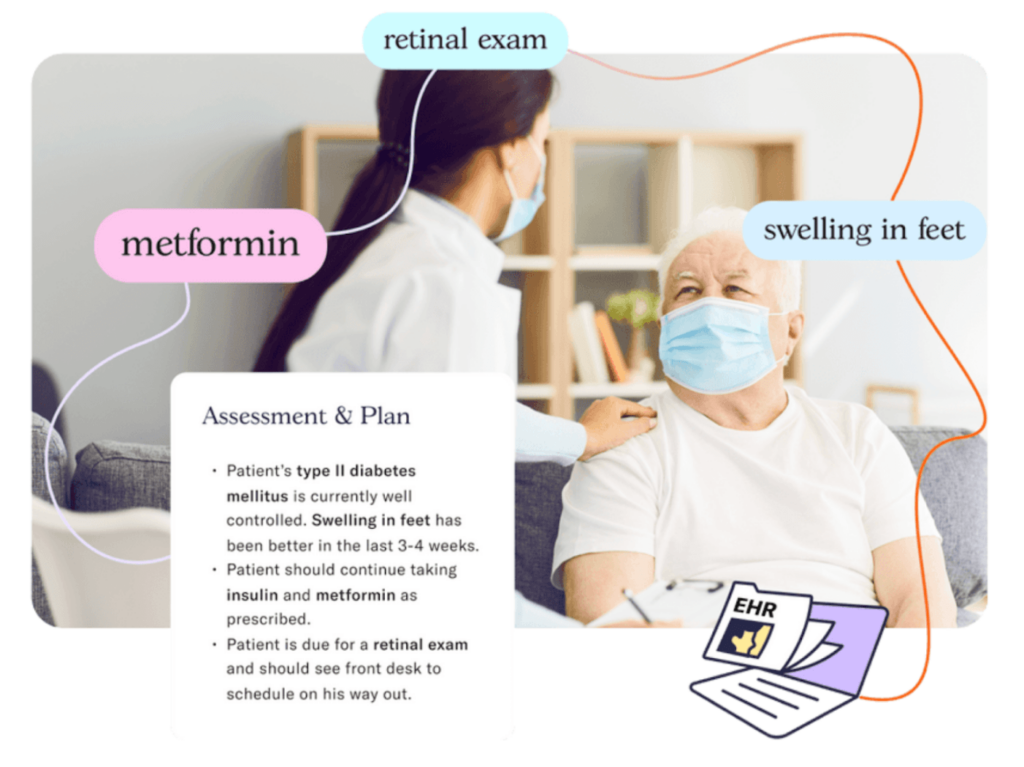By employing cutting-edge technologies, HCPs can experience significant improvements in various aspects of their workflows, ranging from administrative tasks to patient support, professional education, diagnosis, and patient education. In this blog post, we will explore five practical applications and corresponding tools where Generative AI has the potential to revolutionize HCP workflows, leading to enhanced patient care and improved outcomes.
1. Reduce healthcare professionals' administrative burden
One area where Generative AI can make a significant impact is in reducing the administrative burden on clinicians. Through the use of natural language processing and understanding, Generative AI can create and update essential documents such as medical records, prescriptions, referrals, and invoices based on the data provided.
For instance, Nuance offers clinical documentation improvement (CDI) capabilities through its AI-powered speech recognition technology. This innovative tool allows clinicians to dictate their notes directly into the electronic health record (EHR) system, eliminating the need for manual data entry. Not only does this save valuable time, but it also improves the accuracy and efficiency of capturing patient information.

2. Provide 24/7 patient follow-up and support
Generative AI can play a pivotal role in enhancing patient follow-up and support. By leveraging natural language processing, this technology can send personalized reminders and provide answers to patients’ questions, ensuring they receive the necessary guidance and information they need.
One remarkable tool in this realm is Personal.AI. By engaging in natural language conversations, Personal.Ai offers individualized advice and assistance, catering directly to the unique needs of patients, their loved ones, and informal caregivers. Whether it’s explaining health conditions, discussing potential treatments, assisting with appointment arrangements, or providing education about upcoming clinical trials, Personal.Ai equips HCPs with the means to enhance patient communication and elevate the standard of follow-up care.
3. Boost healthcare professionals' further education
Staying up-to-date with the latest clinical information is essential for clinicians to provide the best care possible. Generative AI can be a valuable ally in this regard by helping clinicians find and summarize relevant content.
For example, Paige FullFocus is a powerful tool that enables HCPs to view, manage, and share digital slides of tissue samples. This tool provides novel insights to support treatment decisions, improve accuracy, efficiency, and diagnostic confidence. By studying and analyzing diverse tissue patterns, HCPs can deepen their knowledge and understanding of various hematological and oncological conditions, ultimately refining their diagnostic skills and staying abreast of the latest advancements in pathology.
4. Accelerate diagnosis
When it comes to clinical diagnosis, Generative AI has the potential to significantly accelerate the process and enhance accuracy. By creating new content, Generative AI can augment or enhance the diagnostic process. For instance, it can generate realistic images of a patient’s organs or tissues even from low-quality or incomplete data, such as X-rays, CT scans, MRI scans, or ultrasound scans. This enables clinicians to detect abnormalities faster and with greater precision. Additionally, Generative AI can create natural language summaries of a patient’s medical history, physical examination, laboratory tests, and other diagnostic information, providing clinicians with a comprehensive overview of the patient’s condition and enabling them to make more informed diagnoses.
An excellent example of a tool in this domain is Kahun, an AI-powered clinical reasoning platform that offers ranked differential diagnoses and workup options based on patient input and medical knowledge. By integrating with electronic medical records (EMRs), Kahun helps HCPs expedite the diagnostic process, saving valuable time and effort.
5. Personalize patient education
Effective patient education is crucial for ensuring patients understand their conditions and make informed decisions about their care. Generative AI can greatly enhance patient education by creating personalized content tailored to the individual needs of patients. Whether it’s generating videos, animations, diagrams, or articles, Generative AI can deliver educational materials based on the data and information received.
Abridge, a remarkable digital tool, plays a crucial role in patient education. It transcribes, highlights, and summarizes medical dialogues, eliminating the need for manual note-taking by physicians. Abridge’s consumer app also keeps patients informed about their health by recapping important information for easy reference. By emphasizing crucial details from the dialogue and translating complex medical terminology into more understandable language, Abridge ensures that patients have a clear understanding of their diagnosis, treatment options, and next steps, ultimately fostering patient adherence and positive health outcomes.
Generative AI to transform the landscape of healthcare
Generative AI has the potential to transform the landscape of healthcare, empowering HCPs and revolutionizing patient care. The applications and tools discussed in this blog post represent just a glimpse of the possibilities. However, it’s important to note that the field of Generative AI is rapidly evolving, and new tools and innovations are continuously emerging.
While our online repository of tools and resources provides a selection of innovative solutions, it’s crucial for HCPs to explore the ever-expanding landscape to discover the full range of opportunities and experience the power of Generative AI firsthand. Let us embark on a journey where technology meets healthcare, inspiring a brighter future for all.
Discover how Generative AI (GenAI) can help you personalize care and save time by expanding your capabilities. We’ve worked together with Novartis to curate relevant tools you can apply to your clinical practice today.

